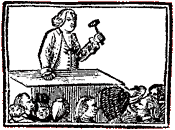Women Who Voted in a Colonial Massachusetts Town Meeting
That statement appeared in print in 1881, in the publication of a speech delivered seventeen years before. That book cited no records from 1756 to support the claim.
I opined that it would have been very unlikely for no one to comment on a woman voting, especially when she supposedly broke a tie on a controversial tax. “It would be nice to see the official records,” I wrote.
Last month an unknown commenter stated: “Uxbridge records for the period are extant both as physical documents in the possession of the Town Clerk and as part of the Holbrook group's microfiche collection. There is no mention of Lydia having voted.”
Just now I came across this Mental Floss article by Jocelyn Sears, also based on a look at actual town records:
But according to records from Uxbridge’s town meetings, there wasn’t any meeting on October 30, 1756, and the town did not appropriate any funds that year for the war or for unspecified colonial purposes. (They did vote to raise money for the local schools, to repair the roads, and to pay the town minister’s salary.) Further, even if Lydia Taft had voted, we’d have no way of knowing, since the official minutes for the town meetings do not list the names of people voting or their votes. The minutes simply state when a vote happened and that a given measure passed or failed.So we can file the story of Lydia Taft voting under myths.
Sears’s article also discusses a documented case of women’s votes being recorded in Sudbury in 1655. At issue was whether the selectmen had apportioned new land fairly in 1649, and whether common grazing rights should depend on the amount of (unfairly?) apportioned land. Sears writes:
Jane Goodenow and Mary Loker were both widows of men who received land in the original division of the meadow. As their husbands’ heirs, each had a stake in this question of sizing the commons. Jane Goodenow owned 25 acres of meadow land, and thus benefited from any policies that favored those with a large acreage. Mary Loker, on the other hand, only owned 5 acres of meadow, and she recognized that tying grazing rights to meadow acreage would disadvantage her. As landowners, both women were theoretically eligible to vote in Sudbury, where the access to the franchise depended on property, though according to custom, women did not vote. But on January 22, 1655, Goodenow and Loker packed into the Sudbury meeting house with over 50 other people to determine how the town commons would be sized.The good news is that Sears’s article included links to images of Sudbury town records. The bad news is that those links have broken.
Acting for herself and as a proxy for a (male) neighbor, Goodenow issued two votes in favor of tying grazing rights to meadow ownership, while Loker issued two votes against the measure (it’s unclear if she was also acting as a proxy).
But—good news again—I found a new link through Digital Commonwealth. This is actually a handwritten transcription of the seventeenth-century original, mandated by a vote in 1857. Which is why we can, you know, read it.
The preceding page records an official town meeting on 22 Jan 1655 (1654 as British colonies dated years then) and concludes with this call for a vote:
You that judge the act of the select men, for sizing the commons to be a righteous act, and do consent with them in their act, discover it by drawing yourselves together, in the one end of the meeting house, to this vote there appeared, those that follow. (see the other side of this leaf.)On the left side of the next page spread are the lists of people for and against the measure. Halfway down the first column is “Jane Goodenow widow for herself and Andrew Belcher.” In the right column at the same line is “Mary Luker widow two votes.”
Following the division, there were disputes about whether all the people listed were eligible to vote. As Sears points out, no one objected to the widows Goodenow and Luker participating.
In 1656, the year after this protest, three of the men who had voted against the Sudbury selectmen’s action led some families a few miles west and organized a petition to the Massachusetts General Court to start a new town. That soon became Marlborough.
I tried to find more information about Jane Goodenow and Mary Luker in the Sudbury town records. Unfortunately, because it was a young town, formed in 1638, an older couple that moved there with their children already born wouldn’t show up in the local records of marriages and births.
I believe that Jane Goodenow was the widow who died on 15 July 1666. Her will identified her late husband as named John. John Goodenow, Sr., died on 28 Mar 1654, in the crucial window between the granting of the land and the vote on the common. His will was abstracted here. The Goodenows had a daughter Jane, who married Henry Wait or Wight by 1654, and they had a son named John by the time widow Goodenow died. (This genealogy webpage contains entries for the Goodenows, but I think some of the identifications are mistaken and can’t verify others.)
Mary Luker’s husband was also named John. They had a daughter named Mary on 28 Sept 1653. Sometime in that year, John died. I can’t find any further information about Mary Luker in either Sudbury or Marlborough.
But we can remember the names of Jane Goodenow and Mary Luker as women who, by virtue of being unmarried widows with property, participated in a protest vote in the Sudbury meetinghouse in January 1655.


